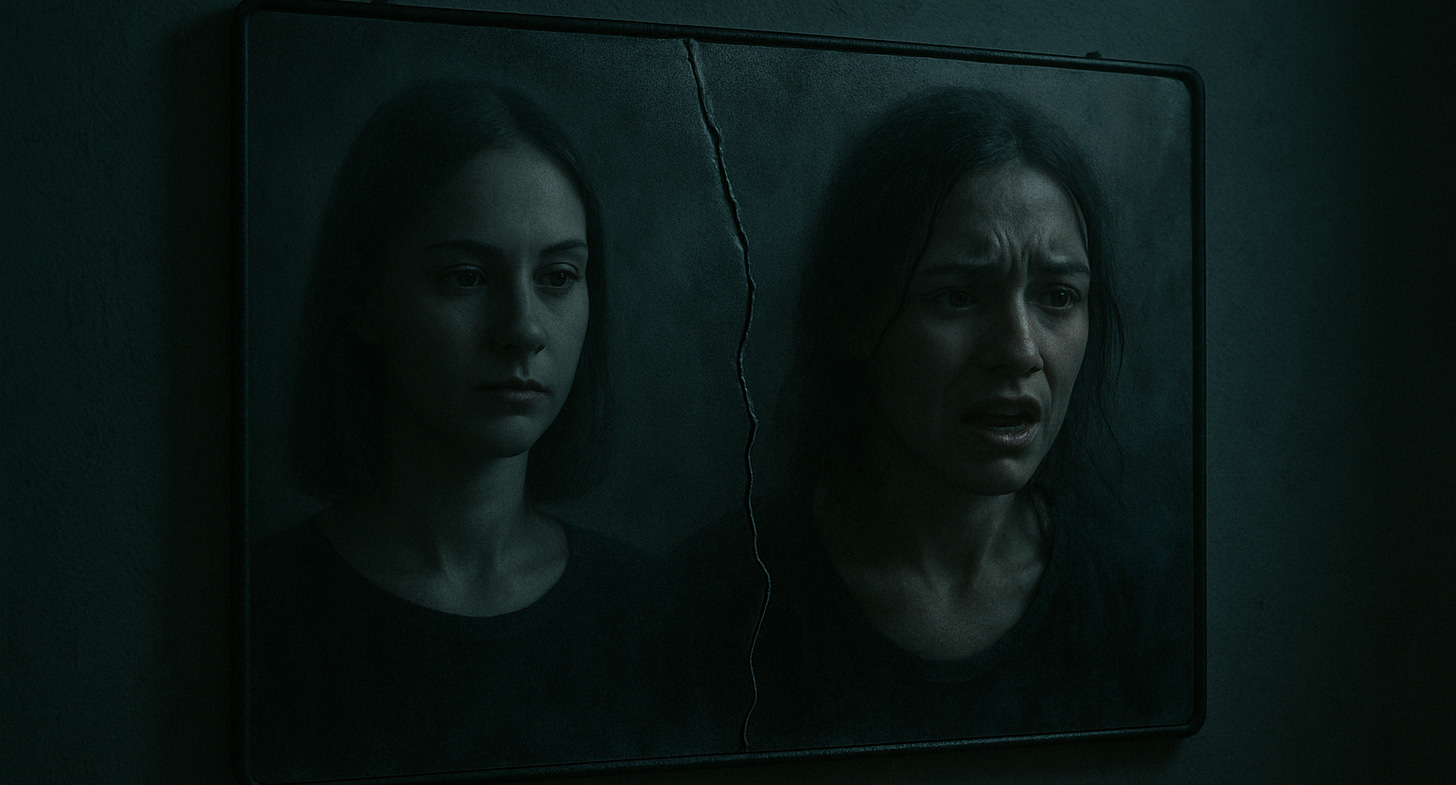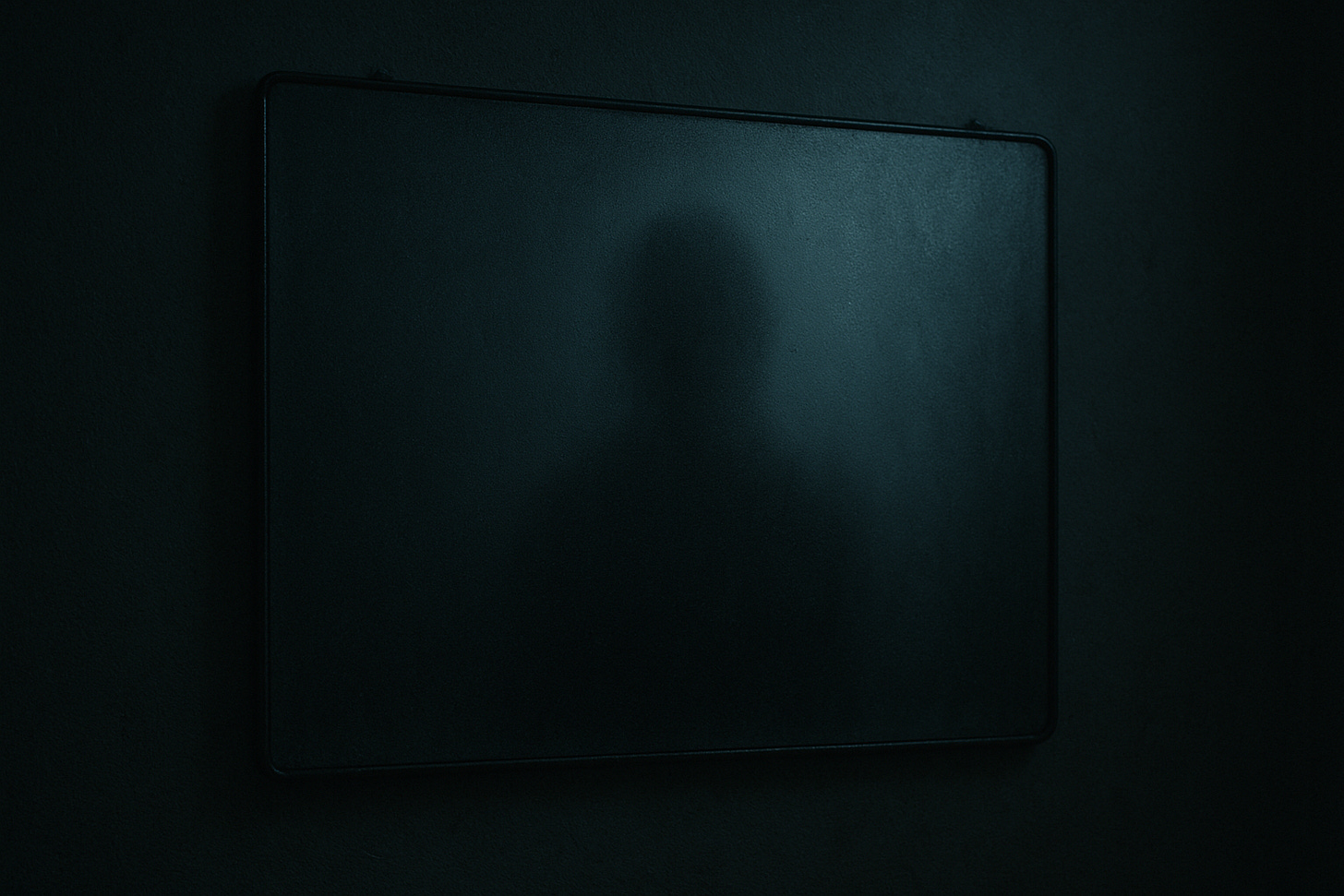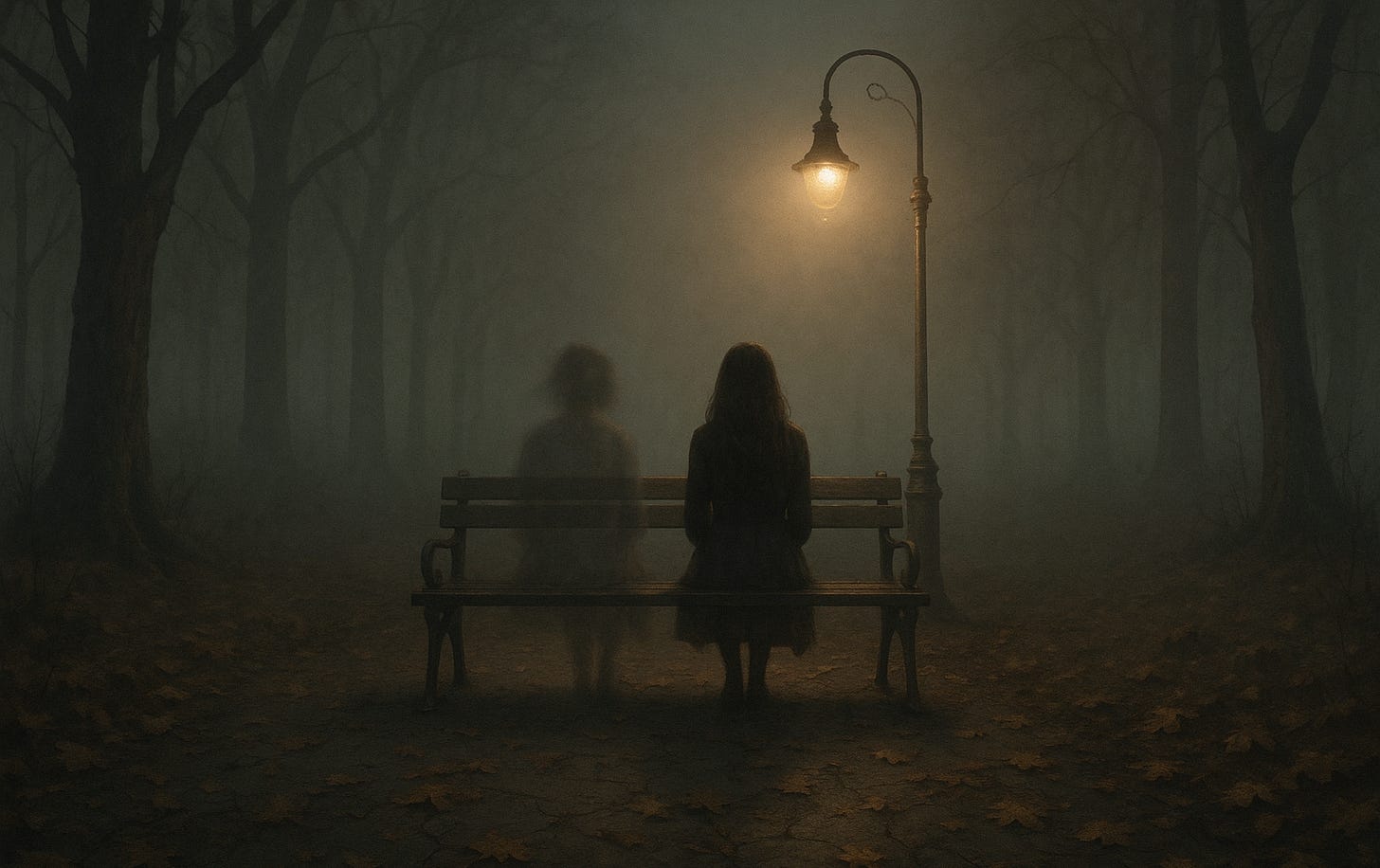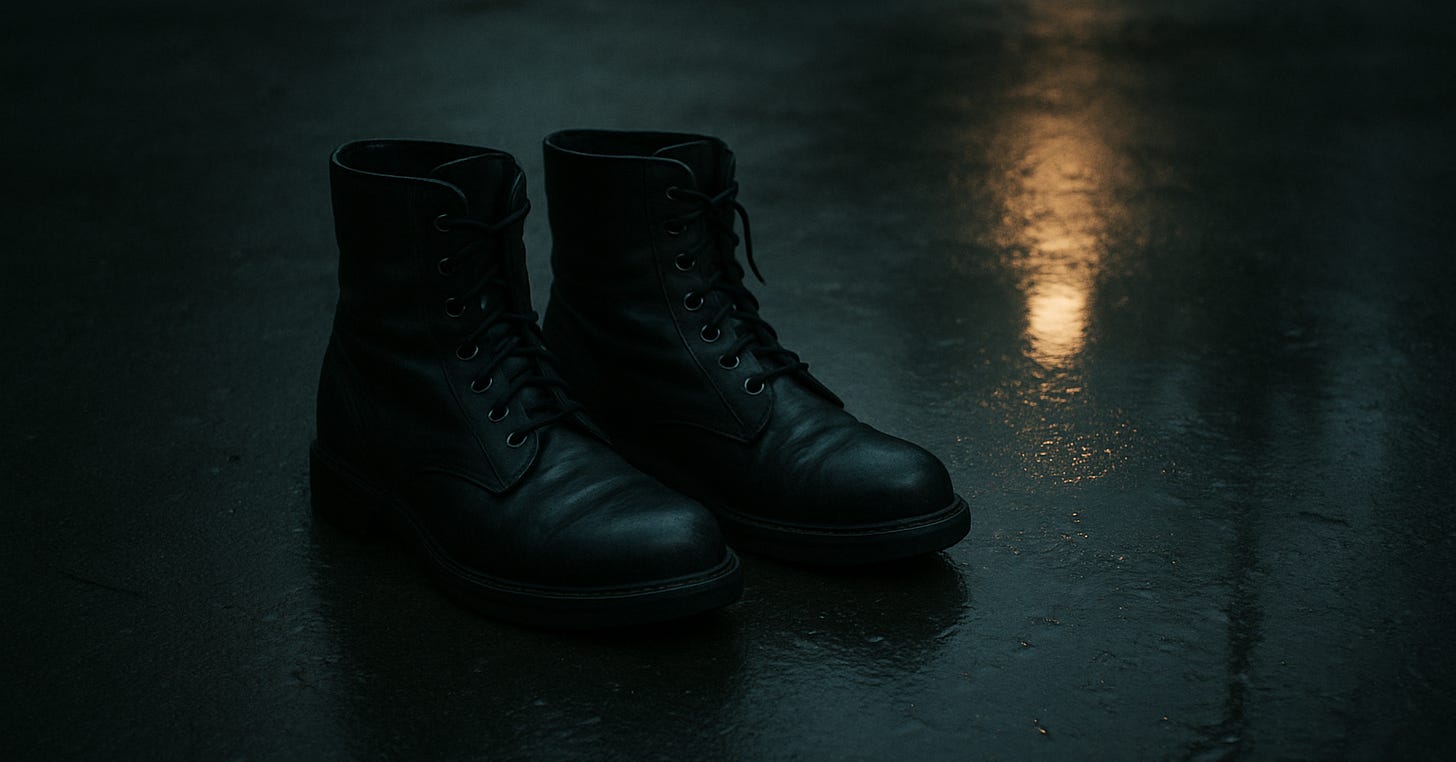🧨🪞 The Version of Me That Made the Kill.
🔥 RSO™ Entry 005 - Internal Myth Cycle, Part I: What happens when the version of you that chose violence comes back to collect.
This was the first version I wrote.
Before I went through a mass edit.When she appears, she doesn’t knock. She arrives like a verdict. The version of you that stopped surviving and started choosing violence. She didn’t heal. She evolved. And now she’s back to collect what you abandoned.
A version of you returns from the timeline where she bled on her own terms and demands to know why you didn’t. If you’ve ever felt like the understudy in your own life, this is the main character kicking down your dressing room door.
This isn’t memoir. It’s an internal myth. A psychological architecture disguised as event. A conversation between versions. The rhythm between them is the story.
Prompt: A version of you arrives from a timeline where she made every decision like a blade. She didn’t survive. She calcified. You have one encounter. No do-over. Just aftermath.
She smelled like the air after a scream that had nowhere to land: sharp, electric, the scent of something that broke through and didn’t apologise. Like ozone before lightning - not the innocent kind, but the kind that hums in your teeth and dares you to flinch.
You meet the version of yourself who did it right, or maybe just did it louder. The one who made all the right mistakes at the right volume. Who didn’t apologise for being sharp at the edges. They’re better than you. They know it. And they don’t pretend otherwise. They don’t soften it for your sake.
This is not an origin story. This is a collision. A psychodrama disguised as a haunting. It’s what happens when envy wears your face and patience runs out. You’re not just watching someone spiral; you’re watching someone claw at a reality that was once theirs, before it calcified in someone else’s spine.
If you’ve ever stared at your reflection and felt like a rehearsal, an echo of a life that didn’t stick the landing, this is for you.
PART I: The Arrival.
It started in a city park that smelled like rusted teeth and wet paper. I was sitting on a bench I didn’t remember choosing, under a sky that flickered like a dying screen. It was October, but not the cosy kind. The air had that glitchy, voltage feel, like a wire was loose somewhere under the skin of the world.
Leaves whispered to themselves. The wind kept trying to say something and giving up. Somewhere, a bird sang the wrong melody and started over. The world felt delayed. Like a file buffering. Like something was arriving.
And then she was beside me.
Not walking up. Not entering the frame. Just there, as if she had always been. As if I’d sat down next to her by accident in a timeline that didn’t belong to me.
She looked like me if someone had scraped out the guilt and filled the cavity with precision. Her posture was architectural, as though she’d been engineered, not raised. Her coat moved like ink in water. Her earrings glinted like tiny, polite weapons. Her smile wasn’t felt; it was drafted. Printed. Just enough charm to seem human. Just enough menace to suggest it was optional.
I wanted to tear the calm out of her face with my bare hands. To taste the steel in her peace. To take that boot - the one I almost bought before I choked on self-loathing and closed the tab - and smash my ribs until something woke up.
Instead, I sat there, like a candle that had forgotten how to burn, while she studied me like a past life she no longer mourned.
PART II: The Cost.
‘I wondered if you’d show,’ she said.
No greeting. No warmth. Just that voice, cool and precise, like a scalpel dragged slowly across a confession. It didn’t rise, didn’t soften. It simply landed, as if it had been said a hundred times before, always with the same ending.
She looked me over like I was a glitch she remembered fixing.
‘Didn’t expect the shoes,’ she added, flatly. Her tone wasn’t mocking. It was clinical. As though she was noting a deviation in a lab sample. As though the trainers were proof of my undeleted shame.
I looked down. Rain-mottled canvas, one lace frayed, the other looped through desperation. They were the shoes of someone trying to pass for okay, and failing with detail.
Her boots were the ones I’d left in an abandoned shopping cart at 2:13 a.m., on a night soaked with guilt and self-disgust. They’d looked too expensive, too decisive. I’d backed away from them the same way I’ve backed away from every version of myself that might have made demands. She wore them as if they’d always belonged to her. As if they had carried her through better choices and worse ones, both made with conviction.
‘You’re doing fine,’ she said - a pause, as if choosing whether to lie. ‘Which is just decay with a playlist.’
I laughed. Reflexively. Like a body flinching before pain. And immediately hated myself for needing her to think I was in on the joke. She didn’t laugh. Didn’t even twitch. Just blinked - like she was taking a photo. Of me. Falling apart. God, was I?
Then came the dissection.
‘You don’t write like it hurts anymore,’ she said. Not cruel. Just bored. ‘Now you write like you owe them clarity. Like you’re afraid of being opaque.’
I bristled. ‘I’m surviving’, the words already brittle on my tongue.
She shrugged. The kind of shrug that’s really a verdict.
‘I didn’t come here to witness survival’. Her eyes scanned me like I was already archived. ‘I came to confirm I made the right kill.’
She leaned closer, her coat whispering around her like a liquid shadow. I smelled her again, that post-storm scent laced with static and aftermath. And beneath it, something worse: the sour, stomach-curdling scent of truth that arrived uninvited.
The world around us was beginning to unravel. The leaves scuttled in circles. A child shrieked in a tone that couldn’t decide if it was joy or terror. The light was coming in sideways. The same bird circled three times. Shadows detached from their sources and flickered, unsure of where to land. It felt like the park had been peeled away from time.
‘What’s it like,’ I asked, ‘your life? In the other timeline. The one where you chose better. Or just bled louder.’
She smiled. Not warmly. Not cruelly. Just... surgically.
‘I don’t explain myself. I let the consequences introduce me.’
That should have been my cue to walk away. To throw some self-forgiving mantra into the air like glitter and exit dramatically. But I didn’t move. I stayed rooted to the bench like a relic, because I wanted something from her. Not forgiveness. Not even understanding. I wanted proof that I hadn’t been wrong to want more.

‘What do you see when you look at me?’ My voice didn’t crack. It surrendered. ‘The me sitting here. Not the idea of me. Just... me’.
She tilted her head. I could see it then, the scar on her forehead. Tiny, faint, but unmistakable.
Mine.
Bike crash, age nine, a stupid race with scraped gravel and a swallowed scream.
Except on her face... it wasn’t a memory. It was still healing. Pink and fresh and alive, like pain she had decided to keep open.
‘You’re still afraid of being disliked,’ she said. ‘You dress your wounds up as credentials. But pain isn’t depth. It’s just loud.’
I winced. Not because it was wrong. But because it was clean.
‘And you?’ I snapped. ‘You think being ruthless makes you real?’
She didn’t answer. Just turned toward the playground as though she’d outgrown this reality decades ago.
‘You still believe you’re only worthy if you’re suffering,’ she said. ‘You’ve built this little altar in your pathetic little mind where joy gets burned in exchange for legitimacy. Like if you ever felt whole, you’d lose your right to speak.’
I didn’t mean to say it, but it tumbled out.
‘I am fake’.
She nodded like a teacher hearing a correct answer too late to change the test.
That’s when the hate bloomed.
I hated her serenity, her knife-precise smile, her posture that looked copyrighted. I hated how she held my scar like it was a talisman and not a trauma. I wanted to unzip her. Not metaphorically. Literally. Peel her skin open and crawl inside and see if I could survive where she lived. I wanted her spine, or at least the name of the god who had given it to her.
‘I didn’t need to ask. But I did, like someone still hoping the poison’s changed.’
‘You already are,’ she said, flat.
‘What did you steal from me?’
Her answer was a slow, blood-warm smile.
‘Nothing,’ she said. ‘You labeled your spine “too much” and left it at the door. Every yes you didn’t mean was a donation. Every apology you made for existing was a signed surrender. I just picked up what you left rotting.’
She stood, and the bench groaned as if grateful to be rid of her.
PART III: The Exit.
She didn’t look back at me right away. She looked at the fog-thin air ahead of her as though it was a door only she could see. The world seemed to lean towards her. Light shifted, wind steadied, even the leaves stopped their nervous scraping. Reality bent a little to make her exit clean.
‘I came to see if you had anything left I wanted,’ she said with a smug look on her face. And then so matter of fact, ‘You don’t.’
It wasn’t cruel. It wasn’t even triumphant. It was the way someone might note a fact, the way a butcher might point at a carcass and say already stripped. No malice, just what it is.
And then she started walking. Her boots made no sound, but the ground remembered. Fog curled at her ankles like a pet. She wasn’t striding; she was being carried.
I wanted to follow. I wanted to tackle her, to claw at her calm until it shredded. I wanted to scream and beg and curse until she cracked open and dropped something, anything, I could steal. But I couldn’t move. My body had gone devotional, locked in a posture of silent asking.
She turned once before she disappeared, sharp as a comma in the throat of a sentence. Her eyes found mine as though she’d left them there on purpose.
‘Try letting them misunderstand you,’ she said. ‘It’s cleaner than bleeding out for their comprehension.’
And then she dissolved. Not vanished. Dissolved, into angles, into scent, into something the air swallowed whole.
The park returned to itself: birdsong limped back into rhythm, shadows reattached, the wind remembered its script. Only the bench and I remained, both of us a little warped.
I sat there long after she was gone. The smell of her still ghosted in the air, that post-lightning tang of a storm that refused to end. I kept the scar. I kept the boots, not literally, but in the part of me that hoards metaphors like weapons.
Which is worse.

Sometimes I still catch her reflection in mirrors, a half-beat behind mine, eyes steady, watching without blinking. Not judging. Not waiting. Just present, as if she’s checking to see if I’ve found my sharpener yet.
And every time I’m about to sand down a blade in my writing, every time I reach for the soft ending, I hear her. Not loud. Not kind. Just true.
‘Write like it cost you something. Or stay silent.’
‘No one needs another prophet afraid to bleed.’
‘If they understand you, you probably lied.’
That’s her legacy, the part she left behind on purpose: not advice, not warning, but a dare. A living dare breathing behind my teeth.
And maybe that’s enough. Maybe she didn’t take everything.
Maybe she left the one thing she couldn’t use -
The hunger.
🔒 Read: ‘The Cut That Didn’t Heal’.
Paid subscribers only.





